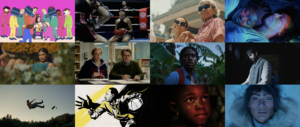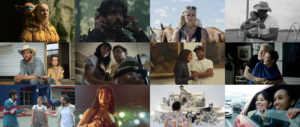Stacy Peralta, Director, Bones Brigade: An Autobiography
Stacy Peralta, the director of Bones Brigade: An Autobiography, shares about his experience with FILM FORWARD in Bosnia and Herzegovina where he screened his film and engaged in dialogue with local audiences.
When I was 17 years old skating pools and being chased out of backyards and down alleyways by cops, I never imagined 40 years later I’d be welcomed to Bosnia and Herzegovina by the US Government’s American Embassy. It just didn’t seem likely or in anyway possible that the US Government would ever host me for anything other than for the apparent trouble my friends and I were causing angry homeowners and general civilians during the skateboard revolution of the 70s and 80s. But strangely time seems to iron things out and lend a greater perspective to all involved. So here I am now as one of the eight filmmakers of the FILM FORWARD international program.
On this leg of the journey we’re traveling through Bosnia and Herzegovina screening our films as part of a larger cultural outreach program a partnership of the US Governments cultural agencies; the President’s Committee on the Arts and Humanities, NEA, NEH and IMLS, and the Sundance Institute. All eight of our films have been specifically chosen for the cultural aspect they illuminate and our primary purpose is to screen our films to underserved communities, those who may have lesser access to films of this size and cultural caliber. We’ve discovered along the way that not everyone has a connection to Netflix, iTunes or Amazon, that for many people in the world, finding smaller independent films and unique documentary films is still a chore and challenge in today’s digital world.
For our first night in Bosnia and Herzegovina our group hops in two cabs that wind through the uphill streets at roller coaster speeds. What is so hard to imagine is that the hill tops surrounding these beautiful stucco and tile roofed homes were commandeered by soldiers just two decades ago. But tonight the light is magical and there is nothing but beauty, the full moon and the sounds of Muslim men at prayer.
We are greeted at Kibe Restaurant by Bosnian filmmaker and force of nature Jasmila Zbanic with her enthusiastic hugs and laughter. Jasmila will be our generous host throughout much of our visit in Sarajevo and its immediate surroundings. Dinner is family style; plates of cheeses and cured meats, marinated red and hot peppers, mushrooms, veal, fresh salads and fire roasted lamb. Jasmila begins the meal with a toast with the local grappa and FILM FORWARD in Bosnia is officially underway.
One thing we do note, however, is that many – too many – of the Bosnians smoke cigarettes. It is uncanny how unused to cigarette smoke we in America are, the amount of smoking we witness is shocking to us. It is legal in all (or at least most) public spaces indoors and out. That said, though it takes us a while to adjust to, it doesn’t prohibit our interactions with anyone nor long dinners in restaurants and coffees in cafes where smoke is ubiquitous.
The first screening of Bones Brigade: An Autobiography is at a multiplex in Sarajevo for both local teenagers as well as students from the surrounding towns. Out of the 100 plus kids there are a surprisingly (to me) large number of teen girls. What I’m surprised by is how engaged these girls are during the Q&A, they have a strong voice, there is a boldness to their interest and they seem to connect with the emotional story of the film about having a dream that no one but you believes in, and having to surmount so many obstacles to achieve that dream, as well as the endure the feelings of loneliness and isolation that are part of that journey.
After most screenings in America I get requests to take pictures with audience members and here in Bosnia and Herzegovina it is no different. Knowing individual audience members might be a bit shy or nervous I always put my arms around them when taking pictures because I want to make a personal connection and make them feel at ease. But often I feel an initial hesitancy, often times they seem unsure how to respond to my gesture, but with the Bosnians I felt an immediate and uninhibited reciprocation – I got big fat hugs the second I reached out to them, they hold nothing back and I’m finding them so at ease. This will happen in every city and town we screen – with men and women, young and old. I will learn more about their culture from this act than from any other. They are warm people, social people, very open and comfortable.
When I’m on film tours like this, I meet a lot of different people in a short amount of time. We cover a lot of ground going from event to event, constantly making introductions and experiencing an intense intimacy even though short-lived. One observation that keeps gnawing at me while we’re on this tour is how all of our different cultures lull us into thinking that we’re all somehow different from one another; we may speak a different language, we may eat different foods, our architecture may be different and we might drive on different sides of the road or not share the same history or religion.




